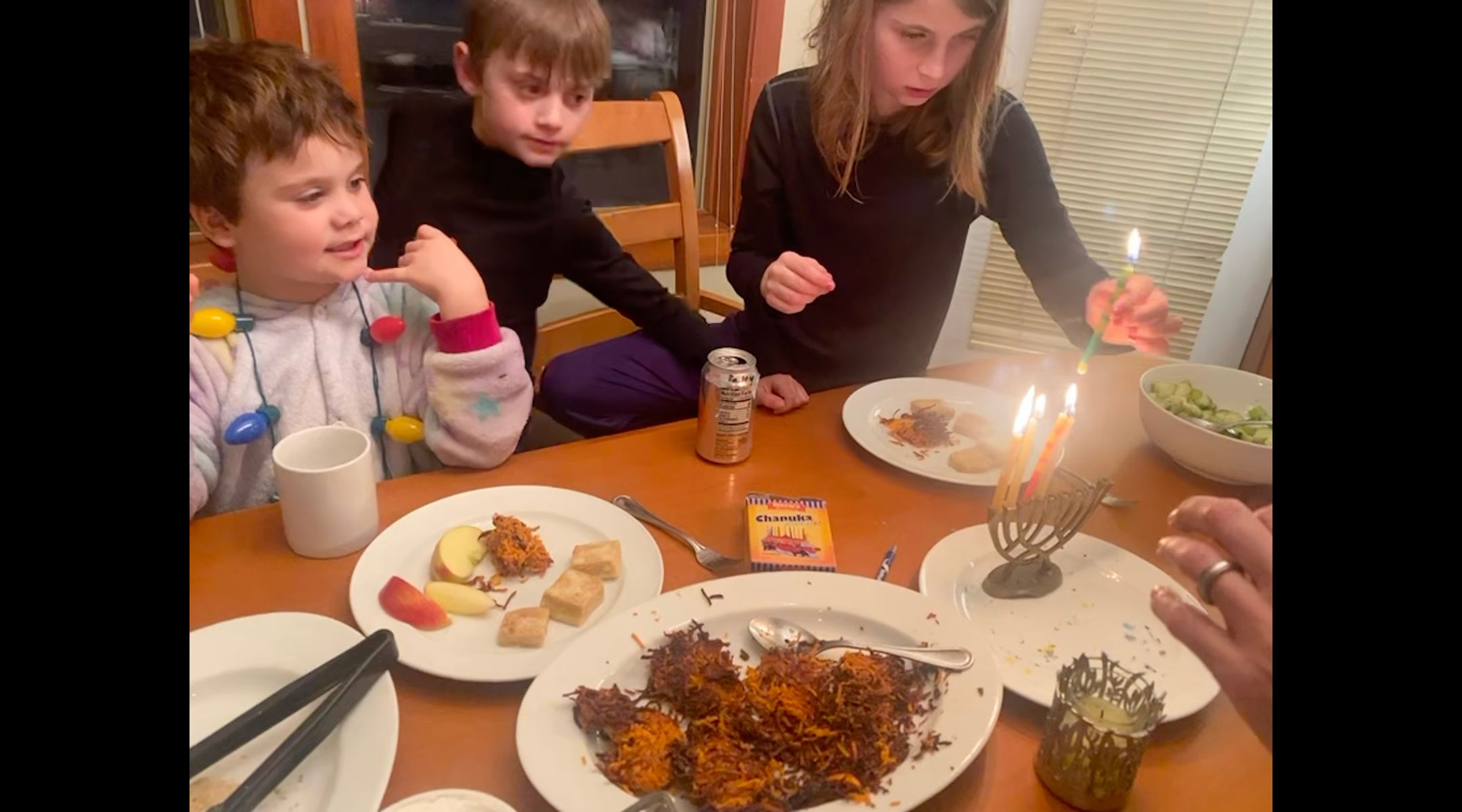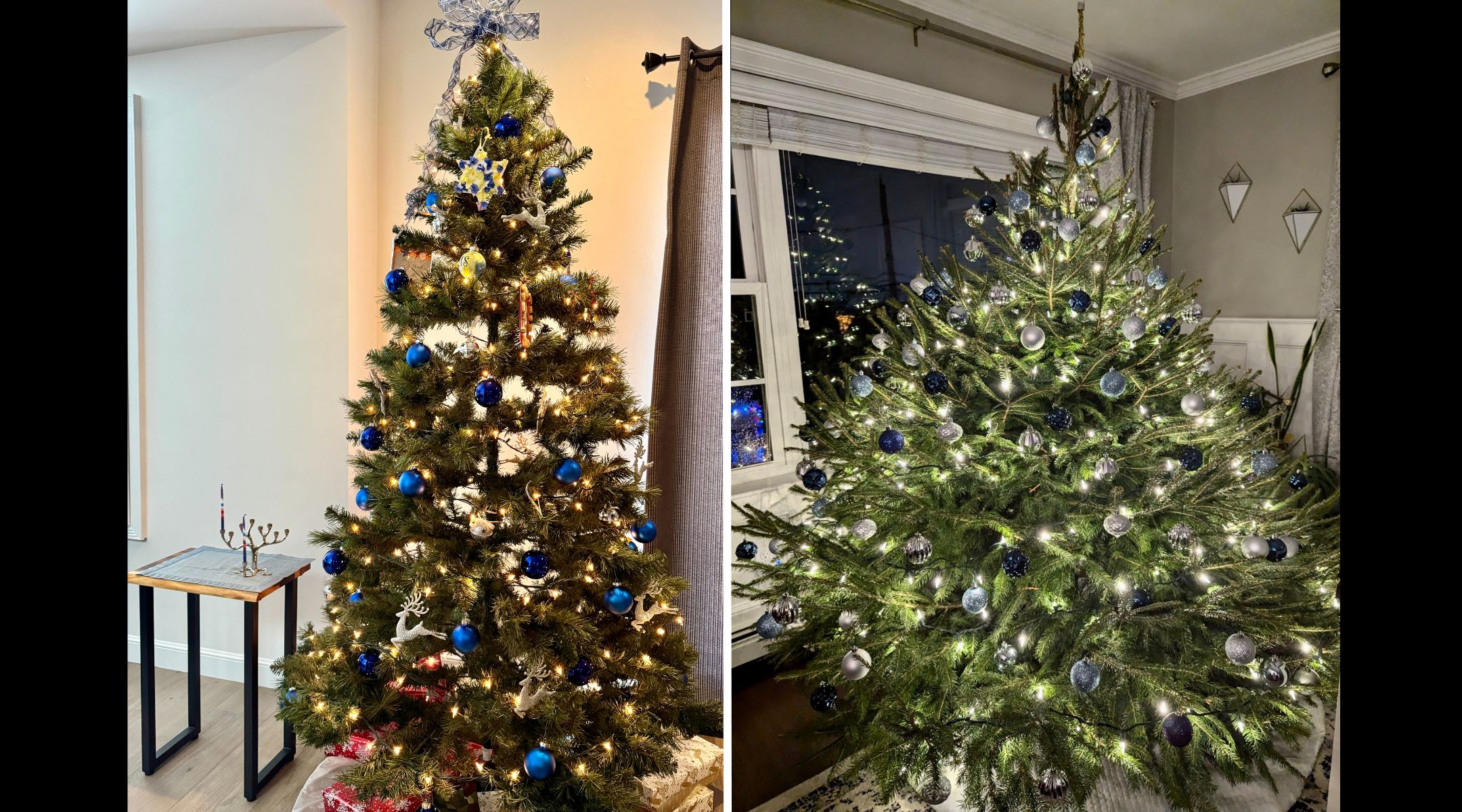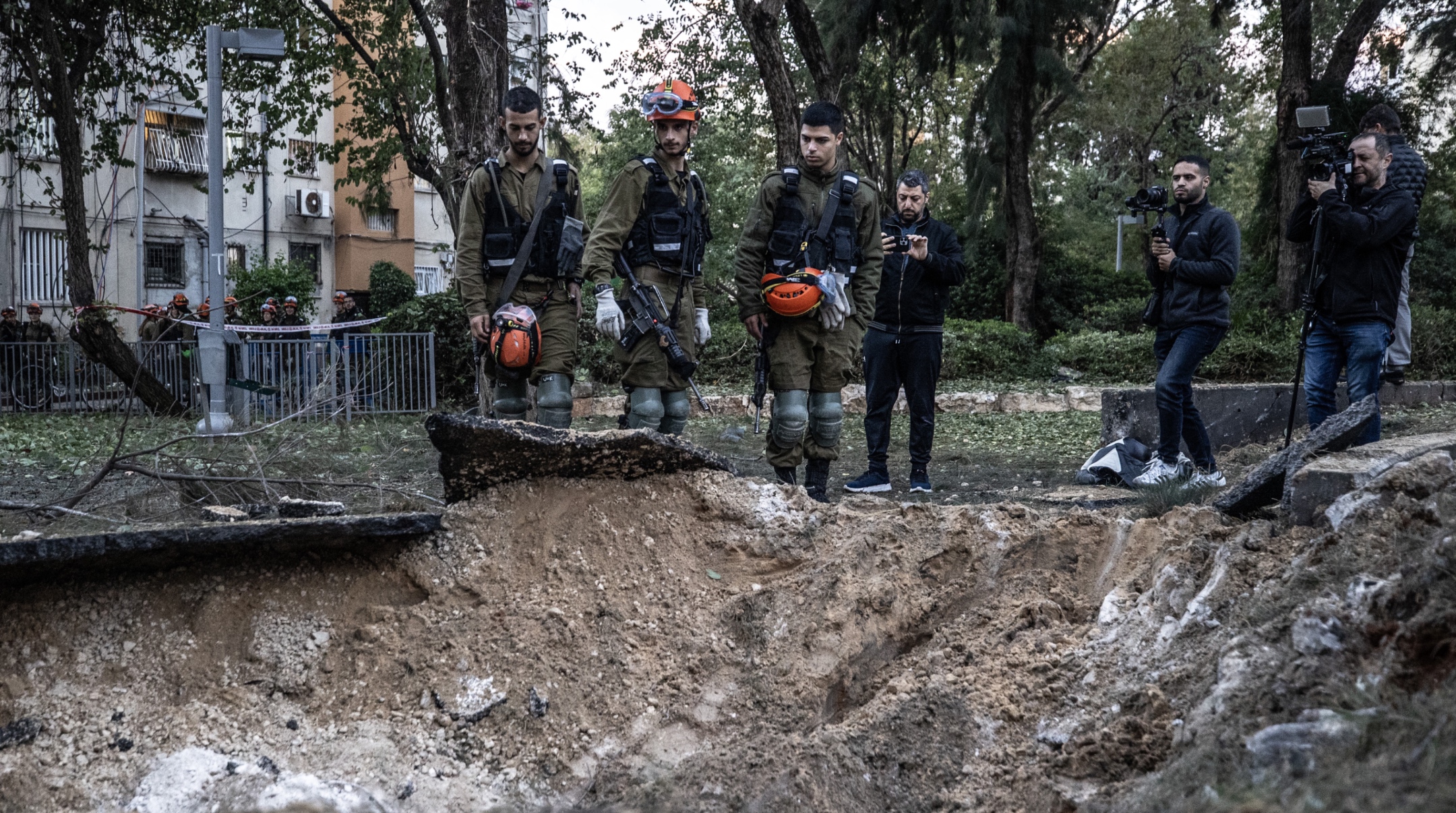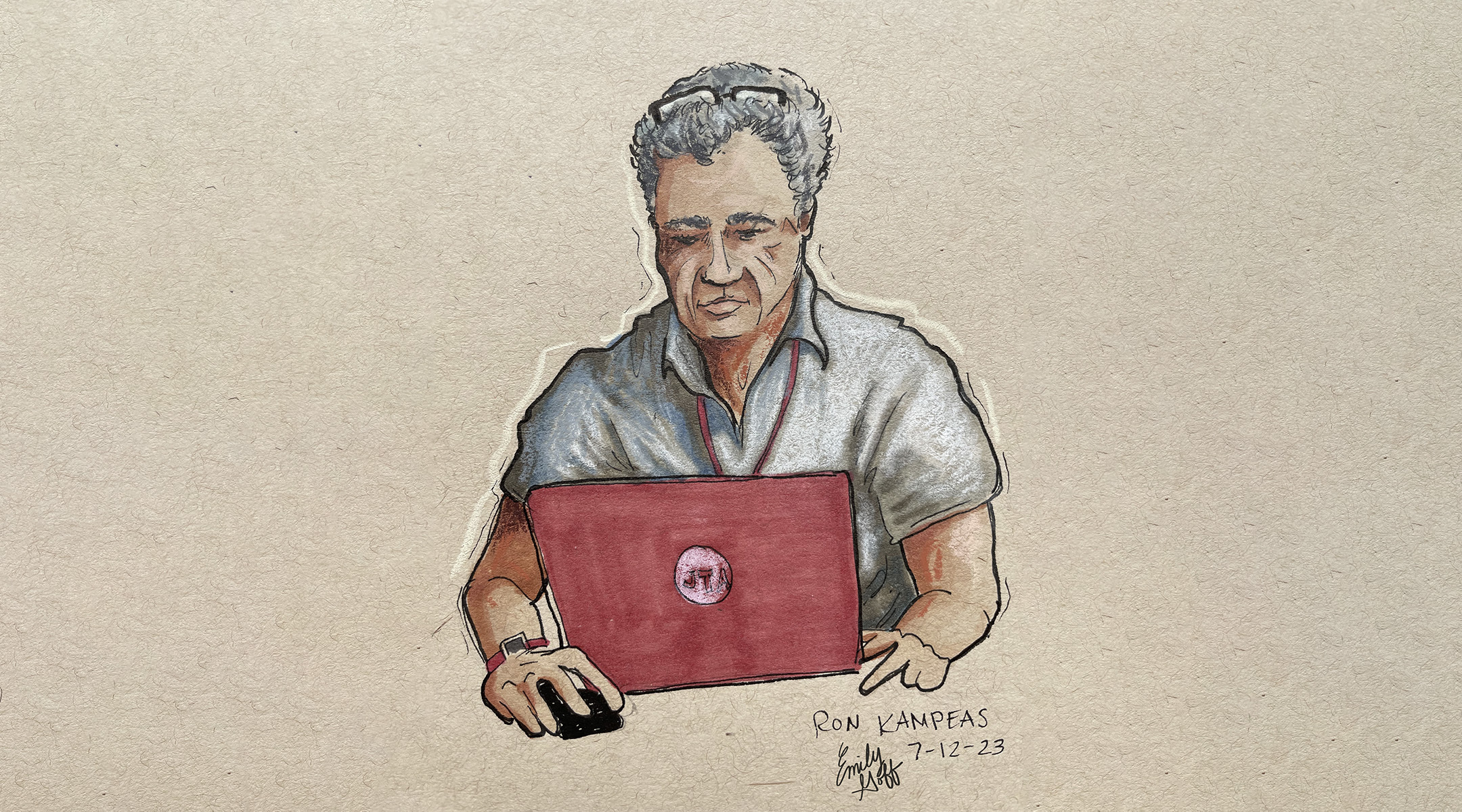When Sarah Levitin first visited her now-husband’s Catholic family for Christmas, she was not expecting to see a menorah in their home.
It was 2016, and the first night of Hanukkah fell on Christmas Eve. Levitin, who grew up attending Jewish day school and traveled to Israel on a Birthright trip, had not planned to light Hanukkah candles when she joined her boyfriend’s Sicilian and Polish family for Christmas. But because his family made an effort to include her traditions, she did.
“I was so incredibly moved by that,” Levitin, 32, recalled in an interview. “Even that gesture, in and of itself, for me, was an indicator that we could make this work, and that interfaith is possible, and that there’s a way to blend and make it our own.”
Eight years later, the holiday convergence many call “Chrismukkah” has returned, as the first night of Hanukkah falls this year on Dec. 25, Christmas Day. For interfaith families, the overlap presents a renewed opportunity to combine holiday traditions, or to create new ones, while also bringing into high relief the tensions that can accompany navigating multiple religions.
For Laurie Beijen and her family, that tradition has been to take a trip during their children’s Christmas vacation — and to avoid the holidays altogether.
Beijen, 50, is a San Francisco native who grew up agnostic and married Ben, a Jew from North Carolina. When they started dating almost 25 years ago, the couple experienced a dilemma common in interfaith relationships — as Beijen put it, “the age-old debate: to tree or not to tree.”
“When we started dating, it was puzzling to me that he had such a reaction against Christmas, because for me, it was not religious,” Beijen said. “It was secular. The tree smells good. You get to bring a tree inside your house once a year. What’s the problem with that?”
Beijen said she tried several different approaches. She got a small tabletop rosemary tree. She decorated the fireplace with green garlands. But none of her solutions were acceptable to her Jewish husband.
Then one year, when Beijen was in a store that was playing Christmas music on repeat, she realized she was also growing bothered by the holiday’s accoutrements. Something clicked.
“When I found myself kind of adopting his grumpiness, for lack of a better word, I feel like that was a watershed moment in our relationship and understanding, you want your home to be a safe space,” she said. “And so if that was infringing on his comfort and mood, it wasn’t really worth me trying to bring in whatever mimicked a Christmas tree.”
Now, Beijen’s family has their own holiday tradition: they get out of town. The family goes skiing in Utah, and then travels somewhere warm — this year, to Cozumel. But even their religion-free custom has a holiday component: the family they travel with, while not Jewish, always requests that Beijen bring latke batter to fry together in Utah.

L-R: Alden Van Dam, Jacob Tulchin and Bailey Tulchin celebrating Hanukkah in Utah in 2019. (Courtesy of Laurie Beijen)
Beijen converted to Judaism in 2015, a decade into their marriage. She said she felt drawn to making official how she had already been living for many years — her children attend Jewish day school, and the family is active at their synagogue. But even after she converted, Beijen said, she still feels like they’re an interfaith family.
“I still feel like we have kind of ‘interfaith issues,’ because of my extended family and because I didn’t grow up Jewish,” Beijen said. “I don’t have the experiences of a lot of people, when you play Jewish geography when you first meet somebody. I didn’t go to camp. I didn’t have the youth group experiences.”
Adam Pollack, the chief program officer of 18Doors, a Jewish nonprofit that supports interfaith couples and families, said his organization tends to field more questions from families when the winter holidays are closer together. And it’s not just new couples who seek consultation, he said, but also new parents, couples who want to reimagine their holiday traditions years into a relationship and many grandparents.
“The way that we generally talk about the holidays with those who come to us is that this is an opportunity,” Pollack said. “That it can seem like a challenge to think about how to honor and respect multiple identities and backgrounds, but actually there’s a richness to it, and there’s no one way to do it.”
Pollack added that navigating the holiday overlap is about more than balancing celebrations. It’s also about family dynamics — which he said have become more complicated since Oct. 7, 2023.
“The effects of Oct. 7 and the war and the rise of antisemitism plays out in interfaith families differently than it might in Jewish-Jewish families,” he said. “There are also elements of, ‘How do I see that person in my family who posted these things online? I know I’m going to see them, help me think that through.’”
18Doors offers a number of online resources to help families navigate the holiday season, like a Hanukkah gift guide that features classics of the holiday — like Hanukkah pajamas and kid-friendly menorahs — as well as offerings for interfaith families, like a “Jewdolph” the reindeer Christmas tree ornament.
Rabbi Nolan Lebovitz, whose Valley Beth Shalom Conservative synagogue in Los Angeles oversees dozens of conversions each year, takes a different approach.
When Lebovitz counsels interfaith families on how to navigate the holidays, he urges them to honor their family obligations surrounding Christmas — but to keep their Hanukkah observance separate.
“I often encourage them to create a Jewish space of the Hanukkah menorah and latkes and all of that traditional space at home, before going out to the in-laws to celebrate their tradition of a tree and the story of faith that’s involved in Christmas,” he said. “I think that Judaism always has a discomfort in the mixing of two different categories, whether they be meat and milk, or whether they be holidays of two different faith traditions.”
In other words, Lebovitz said, “I don’t think that Chrismukkah is the right approach, even though it has marketing appeal.”
To some families, however, the ritual objects associated with each holiday present the perfect opportunity to blend traditions. Anthony Witte — who befriended Beijen at a JCC class for interfaith couples in San Francisco — for example, decorates his family’s Christmas tree with a Star of David.
Witte, 57, grew up in an interfaith family and now has one of his own. He said that while he didn’t have a bar mitzvah, he still feels connected to his Jewish background, which he wanted to pass on to his son.
“When our son was born, or before, we agreed that because Judaism meant more to me than Protestantism meant to my partner, that we could raise the kid Jewish,” Witte said. “So that sort of became my task, my mission impossible, to learn what I could.”
Witte’s family celebrates both Hanukkah and Christmas. He recalled a saying from a previous JCC class, posed to a Jewish spouse who was uncomfortable celebrating Christmas: “So you’re okay with having a Christian in the house, but not a tree?”
“To me, it sort of crystallized — absolutely, I’m taking this person and their traditions, and that’s what interfaith is,” Witte said. “Can’t have one without the other. So not only am I okay with it, but I support it, and that’s really our story now. We do the whole thing. We do the Christmas tree, and we do lights. We do a menorah, we have latkes and anything else that we can find.”

At left, Anthony Witte’s Christmas tree, which features a Star of David topper. At right, Sarah Levitin’s New Year’s tree. (Courtesy)
Each year, Levitin decorates the mantle in her living room, turning it into a seasonal display with elements from both Hanukkah and Christmas. This year, that includes signs that read “Merry Chrismukkah” and “Deck the halls with matzo balls,” alongside small Christmas trees and other Hanukkah decor.
In a nod to her family’s roots in the former Soviet Union, Levitin also decorates a New Year’s tree — part of a celebration called Novy God — which looks similar to a Christmas tree, but in Levitin’s home is decorated with blue, white and silver ornaments and a Ukrainian topper.
“That, in and of itself, is a blend,” Levitin said. “Yes, Dan gets a tree, but we’re able to adorn it with things that are important to me from my heritage, and we’re going to try and make it more of a cultural secular tree, rather than a Santa and Christmas tree.”
Levitin said she and her husband have experienced an evolution of sorts in their approach to Christmas. For years, as they celebrated Christmas with Dan’s family, she said she would subconsciously downplay the classic Jewish approach to the holiday: eating Chinese food and watching a movie.
“In my head, it wasn’t really our holiday, even though we had our traditions, because it was his holiday, and his family went to mass, and I really wanted to honor that,” Levitin said.
But that all changed last year, when Levitin was pregnant and they decided not to travel for the holiday. Instead, Dan drove into Brookline, a heavily Jewish Boston suburb near where they live, to pick up Chinese food.
“He was like, I’ve never seen so many people out, and I’ve never seen a restaurant so populated on Christmas,” Levitin said. “That’s when he realized that, OK, you and your family might not celebrate Christmas, but you have traditions too, and we’ve been ignoring your traditions for six years, and it’s time to start reincorporating your traditions too, even though it might not be the religious meaning of Christmas.”
Then, another surprise: their daughter Esther was born on Christmas Day, four weeks early.
“It really puts into perspective the prioritization of what’s important for my core values,” Levitin said. “Above all else, I see my daughter’s birthday before I see the holidays, regardless of how much Dan went to church and went to mass and went to CCD [a Catholic education program], regardless of how in touch I have been with my Jewish faith, culturally, religiously, what have you. Our daughter is the most important thing.”
Levitin said this year, she and Dan are celebrating Christmas Eve with his family, and then will celebrate Esther’s first birthday — starting with a latke breakfast. She said having her daughter’s birthday as part of the holiday considerations will force them to be flexible.
“It might not be a full 50-50 every single year of what we do,” Levitin said. “There might be some years that we emphasize Christmas more. There might be some years that we emphasize Hanukkah more. There might be some years that we emphasize her birthday more. And that’s all OK.”
Keep Jewish Stories in Focus.
JTA has documented Jewish history in real-time for over a century. Keep our journalism strong by joining us in supporting independent, award-winning reporting.









 English (US) ·
English (US) ·